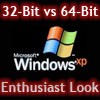- Qualcomm Launches Snapdragon 4 Gen 2 Mobile Platform
- AMD Launches Ryzen PRO 7000 Series Mobile & Desktop Platform
- Intel Launches Sleek Single-Slot Arc Pro A60 Workstation Graphics Card
- NVIDIA Announces Latest Ada Lovelace Additions: GeForce RTX 4060 Ti & RTX 4060
- Maxon Redshift With AMD Radeon GPU Rendering Support Now Available
Enthusiast Look: Windows XP 32-Bit versus 64-Bit

Since Windows XP Pro 64-Bit was released, there has been a lot of speculation of whether it would help current gaming or anything else in general. I put both versions of the OS through a round of benchmarks to see if the 64-Bit does indeed offer any advantage.
Page 1 – Introduction
Since Windows XP Pro 64-Bit was released, there has been a lot of speculation of whether it would help current gaming or anything else in general. I put both versions of the OS through a round of benchmarks to see if the 64-Bit does indeed offer any advantage.
When Microsoft released the 64-Bit version of Windows XP Professional, there were many people wanting to upgrade to see if it would make any difference to their applications. Primarily though, I was concerned with gaming advantages, especially games like Half-Life 2 and Far Cry that can really push hardware and the CPU to it’s limit.
However, there are a couple things to first note about the 64-Bit version of XP. On the “Top 5 reasons to get to Windows XP Professional x64 Edition” of Microsoft.com, they give the straight reasons of why YOU should be using Windows 64-Bit.
They note that it is ready to support the next generation of 64-Bit computing. Up to now, we have not really seen any dedicated 64-Bit software, but only 32-Bit software patched to take advantage of 64-Bit. Large memory support, up to 128 Gigabytes of memory, and 16 Terabyte of virtual memory. Considering the normal gaming computer has 1/128th of the highest supported RAM, and 1/80th of the supported virtual memory, we can easily see that this is certainly not catered to a gamer of any sort.
Looking on though, they also add great support towards developers, and Dual-Core. Unless you are a hardcore multi-media type, gamers currently don’t even have a need for Dual-Core under a regular 32-Bit OS.
Whether the 64-Bit OS is catered to gamers or not, it has to be tested to see if any gain in performance is made anywhere. Is there even an inch of reason to upgrade? I have run a collection of gaming and non-gaming benchmarks within both versions of Windows, and have outputted the results in graphs.
Support our efforts! With ad revenue at an all-time low for written websites, we're relying more than ever on reader support to help us continue putting so much effort into this type of content. You can support us by becoming a Patron, or by using our Amazon shopping affiliate links listed through our articles. Thanks for your support!









